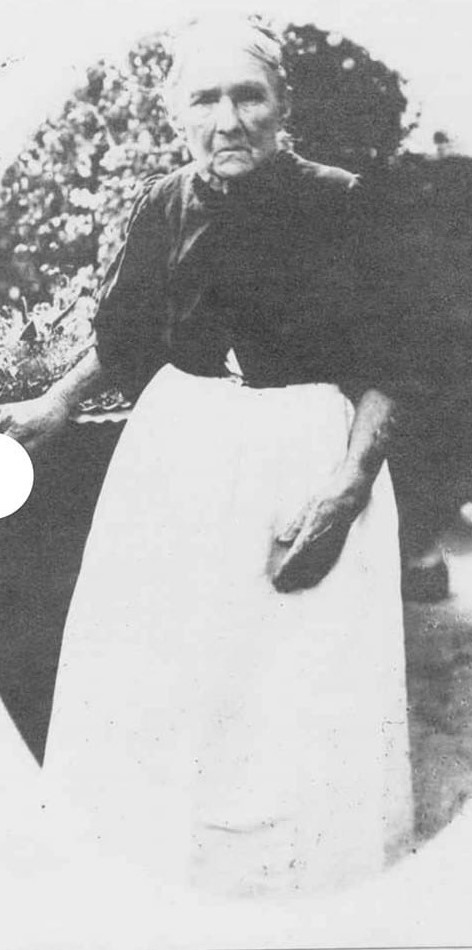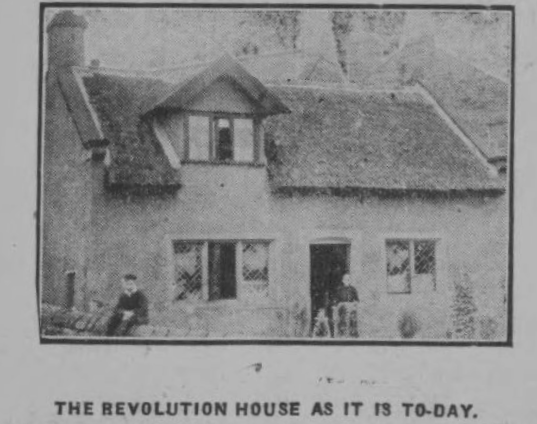
Picture from Derbyshire Courier 28 June 1910

Picture courtesy of Annice Bridgett (via ancestry) descendant of “Mother”.
Old Whittington “Mother”
The Story of Mrs Shepherds Life –
Transcribed from Derbyshire Courier 28 June 1910
Originally written by Jack O’Lantern
I sat in the “plotting parlour” of the old Revolution House talking with “Mother” about the days of stage coaches and listening to her gentle complaints about the oven – the oven that “teks many an hour to bake a bit o’ bread”. Even though a motor car dashed past and sent a cloud of dust over the flowers in the well-kept garden, it was impossible to avoid thinking of the stirring events which has made that tiny cottage at Old Whittington
FAMOUS THE WORLD OVER
For here the Duke of Devonshire, Earl Danby. John D’Arcy met and plotted the fall of James the Second, and started the “glorious revolution” which ended in the placing of William of Orange upon the throne of England. Sitting opposite me was old Mrs Shepherd, “Mother” as everyone calls her, the present occupant of the historic house, who, to all appearances might have been sitting there ever since the momentous days of 1688. Had the plotters stalked in I should not have been greatly surprised for the surroundings were
CONDUCIVE TO ROMANCING.
There was the high old fashioned mantle shelf, the stone floor, a “dresser” that has been in use for centuries and there was the old world figure of “Mother” talking of her girlhood days when she was hired at Dronfield “Statute” fair[1] as a servant, and received 2s 6d “fastening penny”.[2]
Mrs Sarah Ann Shepherd is “shaking” seventy-six, and is the pleasantest and most contented old soul I ever met. She has only one worry in the world; the oven is such a poor thing. I found her busily folding the spotless white clothes which she had been ironing. “Mother” does all her own washing, and won’t even allow any of her daughters to help her.
She was born at Alfreton but, as the practice was in those days, she was put out to nurse, and spent her early years with her foster parents at Staveley and Brimington.
She well remembers being held up by her uncle to see
THE FIRST RAILWAY TRAIN
Run over the old North Midland line.
“And of course you remember the stage coaches?” I ventured. “I do”, she replied with emphasis.
“There used to be an old coach from Sheffield to Chesterfield, and one from Chesterfield to Mansfield. You either had t’ ride outside or be crammed to death within”.
As a toddler she attended a Miss Johnson’s school at Brimington, near when in later years a girl was outraged and murdered by a man named Gough. Seven pence a week was the cost of education, which consisted mainly of learning to knit and sew.
“Mother” pointed proudly to two pictures worked in wool which she did before she was nine.
She wishes she could have stayed a bit longer at school. “I tell thee where I learned to read as much as owt” she went on “and that were at church wi’
TRACING THE PRAYER BOOK
and hymn book”. Curious lessons in reading for sure! And yet I would as soon listen to “Mother” as to the attempts of some young men I know.
When she was nine she had to forsake the classroom, and at Dronfield “Statute” fair she was hired as a servant and was paid 1s 6d a week. [3]
“Oh, I’m not ashamed to tell thee” explained the good old soul “It was a very good cook as could get much more in them days”.
She was only 16 when she came to live at Whittington -on the moor- and it was a different place then. “There were only a dozen houses there, and New Whittington consisted of but three or four houses”.
The place where Sheepbridge works stand was a cornfield, and so was the land which eventually became the site of Staveley Works. But although corn grew where iron is now moulded into many shapes food was dear. Flour was 4s 6d a stone, tea was sevenpence an ounce, and sugar was ninepence a pound.
“The bread was poor stuff” said “Mother”, as she made a grimace expressive of disgust. “It weren’t fit to eat !People had to eat oat cakes”.
“I wish I had a bit of oat cake now though” she added, a smile lighting up her kindly face. “I keep sayin’ I would like to mek a bit, but its such a fireplace and its
SUCH A POOR OVEN
When she was 23 she walked to Dronfield in company with Edwin Shepherd, a Whittington miner, and in the parish church the two were married. He died 25 years ago leaving four sons and five daughters. But “Mother” has been the mother of 16, seven of whom have died. She has 36 grandchildren and eight great grandchildren and they all call the lovable old woman “Mother”. Her numerous relatives are very devoted to her, and I was told it was not an uncommon thing for twenty of them to be in the picturesque old room in the Revolution House together.
For many years “Mother” lived in Long Row Old Whittington, known locally as Lowes Row, but 14 years ago now she came to live at the house
WHERE NOBLEMEN PLANNED
the downfall of a King.
She will never forget the bi-centennial celebrations when thousands gathered in memory of the “great and glorious revolution”. The carriage of the Duke of Devonshire was at the Revolution house when the other end of the procession was near the Chesterfield Hospital.
At the famous Cock and Magpie (or Cock and Pynot as it was known in the days of the Revolution) beer was literally served out in buckets. The crowd was so great that the refreshments had to be brought outside and there ladled out from buckets and “dolly tubs”.
Many extraordinary events have transpired in Mrs Shepherd’s lifetime, and she is full of reminiscences. She remembers when the notorious Charles Peace planned to burglar “The Grange”, and she can tell you about all the ancient halls which still stand in the village.
A plucky woman has “Mother” been, for when her husband died she was left with a large family of young children, and these she kept mainly out of the money she received for cleaning the parish church. Now she is in receipt of an old age pension, she had to relinquish the care of the church on account of her years.
But she still does all “her own cleaning” and washing and baking, and a grandson who came in whilst I was chatting with her asserted that “there is no bread in Whittington like ‘mothers’.”
“But it’s such a poor oven”, repeated the old lady, who trotted off to the pantry to produce a loaf as proof of her statement that she could only bake small loaves on account of the “poorness of the oven”.
The dresser which is
THE ENVY OF ANTIQUE DEALERS
she declares is from three to four hundred years old. Her mother bought it off a man who was “a hundred and one , and as straight as a dart”, and it had been in his family for generations. Dealers are always pestering the old lady, and she told me she has to insult them sometimes, but that is a thing “Mother” couldn’t do. Anyway she’s not parting with the dresser.
Many visitors come to the old thatched house as
PILGRIMS GO TO A SHRINE
but strange to say most of them come from abroad, and are mainly Americans and Australians “they seem to know more about the place than the people that live near” said “Mother”.
And then again we fell to talking of the days of stage coaches and to the meetings of the revolutionists. As the setting sun reddened the sky we walked into the charming little garden, and drank in the perfumed atmosphere. There we stood – “Mother” and I gazing at the thatched roof and ancient walls that have their place in history assured.
“Mother” loves the old place, but as I said goodbye I could not help thinking of the contrast: the peaceful contented old lady and the House of Revolution.
Jack O’ Lantern
[1] A fair or gathering held annually in certain towns and villages for the purpose of hiring servants or farm labourers. (Definition of Statute Fair by Oxford Dictionary)
[2] A deal was sealed by a handshake and the new employer handing over a shilling or a crown (the “fasten penny”). (E.H. Gooch: A History of Spalding).
[3] According to Whites Directory 1852, Dronfield Statute fair for the hiring of servants was held on 3 November
The entry in the 1911 census showing that Mrs Shepherd lived at 52 High St, Revolution House, Old Whittington. Mrs Shepherd died in 1916 aged 82.


Picture from Derbyshire Courier 28 June 1910